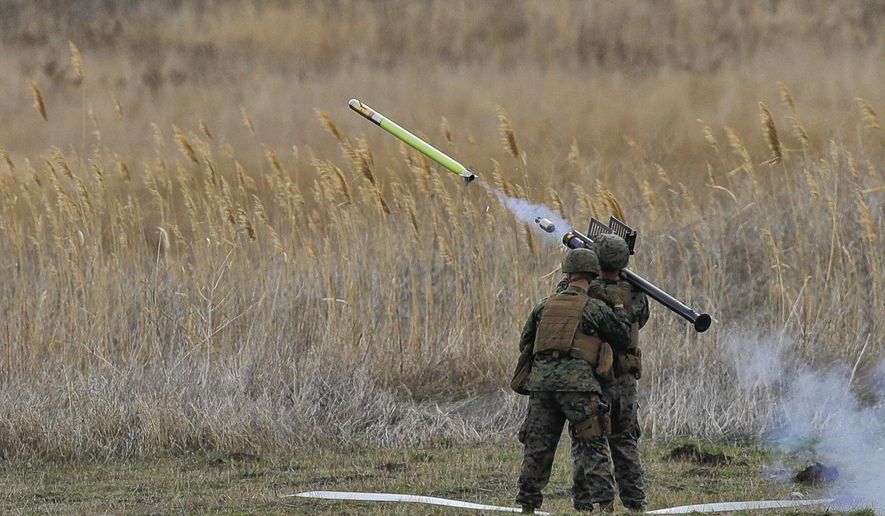The Pentagon is scrambling to replenish its own supply of Stinger anti-aircraft missiles after surging 1,400 of the shoulder-fired systems to Ukraine in the fight against Russia.
Raytheon Technologies CEO Greg Hayes told analysts on Tuesday that with limited component parts in its inventory and a production line that has remained dormant for years, restocking the Army’s own Stinger supply is easier said than done.
“We’ve been working with the [Department of Defense] for the last couple of weeks,” Mr. Hayes said during Tuesday’s first-quarter earnings call. “We’re actively trying to resource some of the material. But, unfortunately, DOD hasn’t bought a Stinger in about 18 years and some of the components are no longer commercially available.”
Before renewing production, Mr. Hayes said Raytheon would need to redesign some of the electronic components in the missile’s seeker head that are no longer available.
“That’s going to take us a little bit of time,” he said. “We’ll ramp up production, what we can, this year. But I would expect this is going to be in ’23 - ’24 where we actually see orders come in for the larger replenishment, both on Stinger as well as on Javelin, which has also been very successful in theater.”
In addition to providing Ukraine nearly a quarter of its supply of Stingers, the U.S. has also shipped 5,500 Javelin anti-tank weapons, which lawmakers warn face a similar lag in production.
SEE ALSO: U.S., allied military leaders defy Kremlin with new Ukraine aid plans
Congress has approved $3.5 billion in funding for the Pentagon to replenish its own weapons stores, including Stingers, after rushing lethal aid to Ukraine.
But funding is only half of the battle, according to former Under Secretary of Defense for Acquisition and Sustainment Ellen M. Lord, who says the challenges that the Pentagon faces in replacing its Stingers point to a more foundational issue with the U.S. defense industrial base.
She said without consistent and predictable weapons orders from the Pentagon, production lines naturally go dormant and supply chains dry up.
“We cannot within the next couple of years produce more because we have a problem with the government not paying to maintain production capacity,” she told the Senate Armed Services Committee Tuesday. “When that happens, you have test equipment become obsolete and not work. You have supply chains with links broken in them, and especially if we had key elements of that supply chain supplied by now-adversarial countries.”
Lawmakers began sounding the alarm over the Pentagon’s dwindling Stinger arsenal soon after the U.S. began sending arms to Ukraine. In a letter to Secretary of Defense Lloyd Austin and Chairman of the Joint Chiefs of Staff Gen. Mark Milley in March, House Armed Services Committee Chairman Adam Smith, Washington Democrat, and ranking Republican Rep. Mike Rogers of Alabama noted the “apparent absence of the Department of Defense plan” to replenish the U.S. stockpile of Stingers sent to Ukraine.
“We believe this is a matter of the highest urgency,” the lawmakers wrote.
Sen. Richard Blumenthal, Connecticut Democrat, said in Tuesday’s hearing that it could take more than two years to replenish the U.S. supply of Javelins and called on President Biden to invoke the Defense Production Act to quickly backfill the arsenal before it is too late.
“The cupboard is empty, or it will be very, very shortly unless the president invokes the Defense Production Act to provide that demand signal on an expedited basis,” Mr. Blumenthal said Tuesday.
Ms. Lord also floated the Defense Production Act as a potential solution, but said the U.S. must also loosen restrictions placed on foreign manufacturers who could add to the production capacity.
“Even with the Javelin, which we do have a hot production line right now, we are still five years out to probably developing all the munitions we need,” Ms. Lord said.
• Joseph Clark can be reached at jclark@washingtontimes.com.




Please read our comment policy before commenting.